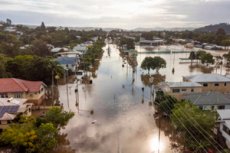
A recent study published by ITC faculty scientists in the International Health Geographics found that floods lead to an increase in the incidence of leptospirosis.
The first author, John Ifejube, is a recent graduate of the Spatial Engineering Master's program. This publication is a direct result of his master's thesis on GeoHealth.
Floods are a climate-related disaster that affects not only the environment, but also human well-being. Leptospirosis is a blood infection caused by the bacterium Leptospira. People become infected through interaction with contaminated water or urine.
Infected people may experience headaches, muscle pain and fever, but severe forms can lead to kidney failure. More and more studies have linked the spread of leptospirosis to floods, but until now this has not been thoroughly studied.
Master's thesis For his master's thesis, Ifejube conducted a study on the relationship between the incidence of leptospirosis and repeated floods in Kerala, India. He found that floods lead to an increase in cases of leptospirosis. His research shows that flood duration is the most important flood characteristic that can be used to predict the number of infections. According to his research, severe floods lead to more cases of leptospirosis than moderate floods.
He compared cases of leptospirosis in three different years in time and space. Specifically, he compared the number of cases in 2018 and 2019, when there were severe and moderate floods, respectively, with the number of cases in 2017, when there were no floods.
For each flood year, he looked at recorded events three months before, during and three months after the flood. To assess the severity of the floods, he identified the population affected by each flood using high-resolution satellite imagery. Finally, he used spatial regression to examine the relationship between the incidence of leptospirosis after floods and the magnitude of floods.

